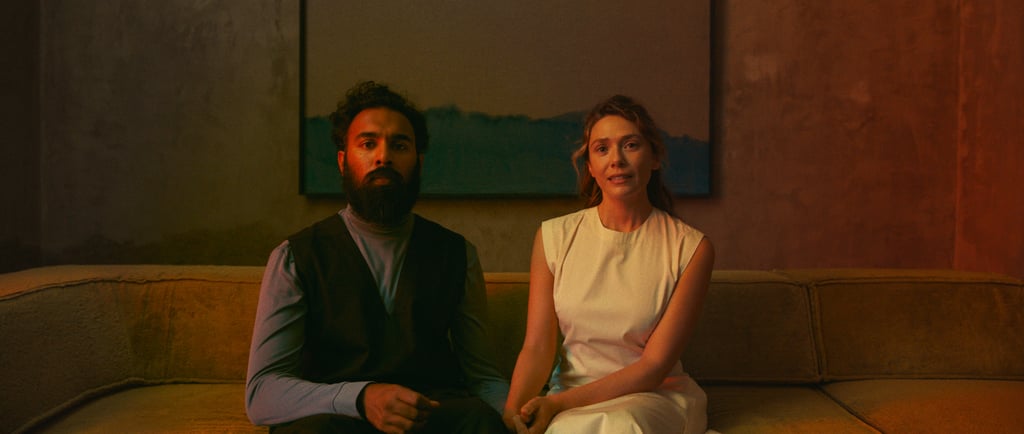‘The Assessment’ director Fleur Fortuné on the Film’s Minimalist Design, Motherhood, and Sci-Fi as Social Commentary
Farah Sadek
5/24/2025


Following its acclaimed premiere at TIFF and ahead of its international digital release on Amazon Prime Video, we spoke with director Fleur Fortuné about her powerful feature debut, starring Elizabeth Olsen, Himesh Patel, and Alicia Vikander. In this conversation, Fortuné discusses the film’s minimalist design, the influence of her music video background, and how her personal experience with motherhood shaped its emotional depth.
FARAH: It was fascinating to watch the movie and take away what you know. As a theater fan, I immediately connected the simplistic production design to Jamie Lloyd’s theater productions, which I love because of how they strip everything back and focus solely on the people. So, I want to know: how did you create a world that feels so sterile? Was any of it inspired by your music video directing days?
FLEUR: It’s funny that you mention theater. I always thought this film was a big challenge for me because it's my first feature, and also, English is not my native language. There’s so much dialogue in the film that I was like, “Oh geez, it’s like I’m directing a theater piece as my first feature,” because almost all of it is filmed on one set. So it's like a chamber piece. I knew the story wasn’t about the sci-fi elements, so I didn’t want the technology to be in the forefront.
I think my music video background helped because I had the freedom to explore everything—there are no narrative rules like in a traditional script. I didn’t study cinema, so I learned everything on set. That widened my scope and allowed me to be inspired by many things like, contemporary art books, an art piece in an exhibition, or sculptures. Music videos are all about the concept, not narrative, and it always goes back to what you want to say.
So, when we were digging into the story and the location, everything had to make sense. For example, [in this post-dystopian reality] there’s no wood anymore because there are no forests. That shapes your idea of what materials you’re going to use for the production design. I was using some references from retro sci-fi films of the '70s. I guess it helped me look outside the box and not do what I was “expected” to do. In that way, the freedom of music videos helped create this universe.
FARAH: I especially love the scenes with Mia and Aaryan, when they're just together and get enveloped in a sea of red.
FLEUR: That was the code of the assessment. I thought using a primary color was good to evoke the feeling and simplicity of childhood. They were sort of trapped in certain ways.
FARAH: The movie addresses a very human topic. If you read the reviews, I think most people project their own biases about natalism or anti-natalism onto it. Was that something you thought about during development?
FLEUR: I didn't want to have a judgment or a bias, although I struggled to have kids and I was doing IVF for many years. I thought I was never going to have kids, and I knew it was something important to me, I just wanted to care about someone else than myself. So, the film has nothing to do with, I think, what most people think they want to have kids for. I think the freedom of choice is very important for me, especially when you see how all over the world right now women are fighting for their rights to have an abortion, and everyone and every country wants to have a say and control when and how they should have kids, and even the implication of men into that.
It was important to raise questions, but I didn’t want to push any opinion about the characters or their endings. I don’t even feel like any of them have different endings. I never wanted to imply that a certain ending is better than another. I think it’s funny how some people try to argue about that.
FARAH: I think Aaryan’s ending was definitely the most… interesting.
FLEUR: See, it’s funny because some people think it’s the bleakest, and others think the exact opposite. I love those discussions because that’s how you start a real conversation.
FARAH: It’s fascinating that the irony is lost on Mia and Aryan about the reality of bringing children into their world. The first thing we see in the movie is deep, cold waters. You immediately feel the coldness of the universe. It’s ironic, too, because some people feel that way about the world we live in now. And of course, with all the global discussions around female autonomy, sci-fi often gets caught between creative speculation and fidelity to reality. So how far do you decide to go in staying grounded to the real world?
FLEUR: We started to develop the script more than six years ago, but it feels like the topic and is even more contemporary to today. It kind of scared me how it was becoming more and more real every day, but what I find more frightening, is the freedom of speech, as you mentioned the US which is supposed to be the country of freedom, and today, it feels like everyone cannot even say their opinion, and it's a big turning point right now in every country.
So, while we were making the movie, it became even more important to raise questions like, do we want to live in a world where we cannot choose what we want, and we just decide to follow the states in whatever decisions they make? I think what is interesting about the Assessment is that at the beginning, if you had told Mia and Aaryan that they’re going to have to go through that, they probably wouldn’t proceed with the assessment, but it’s interesting how easily you can be trapped in a dictatorial state. It starts with one thing, then another, and by the end of it, you're like, how did I accept all that? I didn’t see it coming.
FARAH: It’s definitely a boiling frog syndrome situation.
FLEUR: Exactly.
FARAH: You mentioned that your experience having your daughter lent itself to the film when you were approached with the script. I’m curious if you think you would have done anything differently if this project had come to you ten years ago?
FLEUR: I don’t know. Before I gave birth to my daughter, I was scared it was going to be difficult to balance with my work as a female director—even though I was trying so hard [to conceive]. But since having her, I’ve worked even more, and it hasn’t been difficult at all.
It has nothing to do with the film itself, but I realized that it’s not necessarily reality, it’s just society telling women they can’t do both. For me, it felt so easy to have her. She loves being on set. Every time she comes to a shoot, she’s like, “Ah! It’s my mother!” So, if anything, I would have been more stressed to approach this film without her.
FARAH: That's such a lovely sentiment to share with other women.
FLEUR: Yeah, I feel like it’s very important to share these stories. I’ve worked with a lot of women on set and younger women have told me they don’t want to have kids, which is totally fine. But the reason they give is always that they feel they have to choose between motherhood and a career. And I’m like, no, you don’t. You’re free to do both.
FARAH: Of course, we have to talk about that cast. They all have great sci-fi backgrounds—Himesh Patel in Black Mirror, Elizabeth Olsen in WandaVision. I was also thinking about Alicia Vikander in Ex Machina, and how now she gets to play a character on the opposite end of that spectrum. How were those casting conversations?
FLEUR: What Elizabeth has is just so special. She has such a strong connection to humanity. She's very grounded, and it's quite rare, but she has that connection with the audience that when she feels something, you really feel for and with her. I needed someone like that for her Mia because she’s the placeholder for the audience in a way. And Himesh is such a brilliant mind, and he has this great British humor, and in any situation, he can just improvise and come up with something hilarious. Finding someone for Aaryan was not easy because I wanted to have someone that is nice, a bit of a geek, a tech genius, who doesn't feel too weak or like a bad guy, and Himesh was the perfect fit.
It’s funny how some people told me they kept thinking Virginia was going to be revealed as an AI or a robot, because they associate Alicia with Ex Machina. What I really love about Alicia is that she’s always trying to explore scenes in different ways. She ends up choosing the version you don’t expect, which makes every scene a bit unsettling. That was perfect, because the experience of the assessment had to be unsettling. Her character has so many sides: Virginia, Grace, and her past, and Alicia knows how to dig into all those boxes.
The Assessment is now streaming worldwide on Amazon Prime Video.


